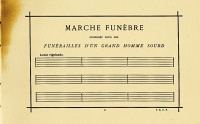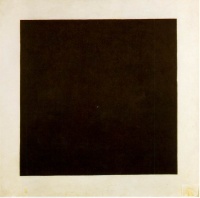Void
From The Art and Popular Culture Encyclopedia
(Difference between revisions)
| Revision as of 11:52, 3 May 2014 Jahsonic (Talk | contribs) ← Previous diff |
Revision as of 11:53, 3 May 2014 Jahsonic (Talk | contribs) Next diff → |
||
| Line 1: | Line 1: | ||
| + | [[Image:Black Square by Malevich.jpg|thumb|right|200px|''[[Black Square]]'' (1915) by [[Kazimir Malevich]]]] | ||
| + | [[Image:Marche Funèbre composée pour les Funérailles d'un grand homme sourd.jpg|thumb|left|200px|''[[Funeral March for the Obsequies of a Deaf Man]]'' (1884), a composition by [[Alphonse Allais]]. It consists of nine [[blank]] measures and predates comparable works by [[John Cage]] ("[[4′33″]]") by a considerable margin.]] | ||
| + | |||
| {{Template}} | {{Template}} | ||
| - | '''''A Void''''', translated from the original French '''''La Disparition''''' (literally, "The Disappearance"), is a 300-page French [[lipogram]]matic [[novel]], written in 1969 by [[Georges Perec]], entirely without using the letter ''[[e]]'' (except for the author's name), following [[Oulipo]] constraints. | + | '''Void''' is an adjective used to denote containing [[nothing]]; [[empty]]; [[vacant]]; not occupied; not [[fill]]ed; |
| - | ==Translations== | + | '''Void''' may also refer to: |
| - | It was [[translation|translated]] into English by [[Gilbert Adair]], with the title '''''A Void''''', for which he won the [[Scott Moncrieff Prize]] in 1995. Three other unpublished English translations are titled '''''A Vanishing''''' by [[Ian Monk]], '''''Vanish'd!''''' by John Lee, and '''''Omissions''''' by Julian West. | + | |
| - | + | ||
| - | The book has also been translated into German (by Eugen Helmlé as '''''Anton Voyls Fortgang''''', 1986), Italian (by Piero Falchetta as '''''La scomparsa''''', 1995), Spanish ('''''El secuestro''''', 1997), Swedish (by Sture Pyk as '''''Försvinna''''', 2000), Russian (by Valeriy Kislow as '''''Исчезание''''' ''[Ischezanie]'', 2005), [[Turkish language|Turkish]] (by [[Cemal Yardımcı]] as '''''Kayboluş''''', 2006), Dutch (by Guido van de Wiel as ''''''t Manco''''', 2009), Romanian (Serban Foarta as '''''Disparitia''''', editura Art, 2010) and Japanese (by Shuichirou Shiozuka as '''''Emmetsu'''''(煙滅), 2010). | + | |
| - | + | ||
| - | All translators have imposed upon themselves a similar lipogrammatic constraint to the original, avoiding the most commonly used letter of the [[alphabet]]. This precludes the use of words normally considered essential such as ''je'' ("I") and ''le'' (masculine "the") in French, and "me" and "the" in English. The Spanish version contains no ''[[a]]'', which is the second most commonly used letter in the language (first is "e"). | + | |
| - | + | ||
| - | ==Plot summary== | + | |
| - | ''A Void'''s [[Plot (narrative)|plot]] follows a group of humans looking for a missing companion, Anton Vowl. It is in part a [[parody]] of ''[[noir fiction|noir]]'' and [[horror fiction|horror]] [[fiction]], with many stylistic tricks, gags, plot twists, and a grim conclusion. On many occasions it implicitly talks about its own lipogrammatic limitation, highlighting its unusual orthography. By and by, protagonists within ''A Void'' work out which symbol is missing, but find it a hazardous topic to discuss, as any who try to bypass this story's constraint risk fatal injury. Philip Howard, writing a lipogrammatic appraisal of ''A Void'' in his column, said "This is a story chock-full of plots and sub-plots, of loops within loops, of trails in pursuit of trails, all of which allow its author an opportunity to display his customary virtuosity as an avant-gardist magician, acrobat and clown." | + | |
| - | + | ||
| - | ==Major themes== | + | |
| - | Both of Georges Perec's parents perished in [[World War II]], and he was brought up by his aunt and uncle. [[Warren Motte]], writing an article on Perec in the literary magazine ''Context'', picks up on this and interprets the themes of the book as follows. | + | |
| - | + | ||
| - | :The absence of a sign is always the sign of an absence, and the absence of the E in ''A Void'' announces a broader, cannily coded discourse on loss, catastrophe, and mourning. Perec cannot say the words ''père'' ["father"], ''mère'' ["mother"], ''parents'' ["parents"], ''famille'' ["family"] in his novel, nor can he write the name ''Georges Perec''. In short, each "void" in the novel is abundantly furnished with meaning, and each points toward the existential void that Perec grappled with throughout his youth and early adulthood. A strange and compelling parable of survival becomes apparent in the novel, too, if one is willing to reflect on the struggles of a Holocaust orphan trying to make sense out of absence, and those of a young writer who has chosen to do without the letter that is the beginning and end of ''écriture'' ["writing"]. | + | |
| - | + | ||
| - | In French, the phrase "sans e" ("without e") sounds very much like "sans eux" ("without them"), another encrypted reference to loss. | + | |
| + | *[[Lack]] of matter, or [[vacuum]] | ||
| + | *Void, or [[Shunyata]], Buddhist philosophical concept | ||
| + | *[[Nothing]], is the absence of everything or a void. | ||
| + | ==Namesakes== | ||
| + | *[[Sir Nose Devoid of Funk]], character of P-Funk mythology | ||
| + | *''[[A Void]]'', English translation of Georges Perec's ''La Disparition'' | ||
| + | ==Etymology== | ||
| + | From Old French ''vuit, voide'' (modern ''vide''). | ||
| ==See also== | ==See also== | ||
| - | * ''[[Gadsby (novel)|Gadsby]]'', another novel without the letter 'e'. | + | *[[0 (number)]] |
| - | * ''[[Le Train de Nulle Part]]'', a novel without any verbs. | + | *[[Abyss]] |
| - | + | *[[Bottomless pit]] | |
| + | *[[Empty space]] | ||
| + | *[[Nihilism]] | ||
| + | *[[The Void (philosophy)]] | ||
| + | *[[Saut dans le vide]] by by Yves Klein | ||
| + | *In [[modern sculpture]], void is a sculptural concept | ||
| + | *''[[Treatise on the Void]]'' by Blaise Pascal | ||
| + | *[[Zero]] | ||
| {{GFDL}} | {{GFDL}} | ||
Revision as of 11:53, 3 May 2014

Funeral March for the Obsequies of a Deaf Man (1884), a composition by Alphonse Allais. It consists of nine blank measures and predates comparable works by John Cage ("4′33″") by a considerable margin.
|
Related e |
|
Featured: |
Void is an adjective used to denote containing nothing; empty; vacant; not occupied; not filled;
Void may also refer to:
- Lack of matter, or vacuum
- Void, or Shunyata, Buddhist philosophical concept
- Nothing, is the absence of everything or a void.
Namesakes
- Sir Nose Devoid of Funk, character of P-Funk mythology
- A Void, English translation of Georges Perec's La Disparition
Etymology
From Old French vuit, voide (modern vide).
See also
- 0 (number)
- Abyss
- Bottomless pit
- Empty space
- Nihilism
- The Void (philosophy)
- Saut dans le vide by by Yves Klein
- In modern sculpture, void is a sculptural concept
- Treatise on the Void by Blaise Pascal
- Zero
Unless indicated otherwise, the text in this article is either based on Wikipedia article "Void" or another language Wikipedia page thereof used under the terms of the GNU Free Documentation License; or on research by Jahsonic and friends. See Art and Popular Culture's copyright notice.


